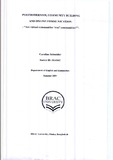Postmodernism, community building and online communication: -"Are virtual communities 'real' communities?"

View/
Date
2009-07Publisher
BRAC UniversityAuthor
Schneider, CarolineMetadata
Show full item recordAbstract
This paper serves to analyze the relationship between postmodernism, community building, and the development of online communication. Special emphasis is put on investigating how virtual communities such as facebook have developed in the post modern era, and how they eventually affect social interaction.
My research paper opens with an overview of both modernism and postmodernism in order to give a comprehensive illustration of significant features and societal and cultural conditions of both eras. The role of technological advancement, in particular the emergence of new media forms such as the internet, is part of this broad analysis.
Having proposed in Chapter One that postmodernism brought along significant changes for societies on different levels, the Chapter Two continues to examine how community building has changed in the technologically driven postmodern times. The main dichotomy between traditional concepts of community as consisting of strong and weak ties between people in “real-life,” and more progressive ideas of community as delocated groups of people who share the same interests is analyzed in this context.
The Chapter Three serves to illustrate and evaluate the dabate about whether virtual communities can be ‘real’ communities given the example of facebook.
The findings show that firstly, we need to develop abroad theoretical framework to understand and evaluate the relationship between postmodernism and virtual communities. Secondly and most importantly, the conclusion was that virtual communities are neither replacing “real-life” communities, nor do they differ extremely from them. Virtual communities might be useful additions to our social lives and certainly reflect the postmodern condition that dicates our lives today.
Keywords
English and humanitiesDescription
This thesis is submitted in partial fulfillment of the requirements for the degree of Master of Arts in English, 2009.Type
ThesisCollections
- Thesis, B.A. (English) [624]
